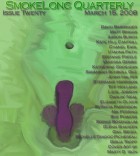I’ve read this many times now, and each time, I’ve come to a different conclusion. A few thoughts that have popped into my head: the wings are a metaphor for freedom; Sven is/was an angel; this was an arranged marriage. Our guest editor, Claudia Smith, at first thought Sven was a fly. Would you care to clarify our musings, or leave them as is?
I think I’d rather leave them as is, mostly because any one of those musings is probably better than my own interpretation.
Let’s talk names. Sven and Kizmet. How do the names enhance the overall meaning of the story?
I don’t know if the names enhance the reading of the story, except I think they lend it a slightly more “magical” feel. More so than for reading though, I think the names were a big help in my writing of the story. I wrote the first draft of this forever ago and, at the time, I was really bored with everything I wrote. I was trying to break out of the tedium of writing about the same people and stuff over and over, and throwing a couple of names that I would never normally use into the mix really helped open the story up.
At one point there was a long riff in the story about Kizmet’s name and how Sven thought their meeting was “meant to be.” It was pretty lame and cliché and so I just had Sven comment on the clichéness of it, thinking that got me off the hook, but then I finally cut it altogether.
“Kizmet rolled toward Sven, up onto her arm like a kickstand.” I love this image of her arm like a kickstand. It surprised me and made me smile. What’s your favorite image in the story?
That might be my fave image as well, thanks. Or, actually (I just had to reread the damned thing to refresh my memory), ignoring the fear of self-congratulation, I think my favorite image might be Sven’s wings brought up over his head, the rain falling and guttering down between them. It is easy to hate a lot of what you write, but I think I like that paragraph.
You constantly take Hobart, your literary journal, to new levels. Can you give us any hints on what you’re planning to do next?
Thanks. I don’t think I try to keep taking it to new levels so much as I am trying to just keep doing it. And, in the process, the hope is always for every issue to be as good as, and hopefully better, than the last. No real secrets on upcoming plans. I have a few ideas, but they are as likely to not happen as happen, so I don’t want to set myself up for not following through. Right now, I am enjoying doing a theme issue with every other issue (print) just because it is fun to build issues around a theme that I like reading about. And it makes it easier to step outside the regular submissions and ask some of my favorite writers to contribute if I have something specific I am looking for. So, in that regard, next up is games.
After that, another regular issue. After that… well, I can barely think ahead to the games issue still.
While reading through the annual Kathy Fish Fellowship applications, I was struck by the number of writers who were using flash as, to paraphrase, a means to an end. Most people weren’t writing flash because they loved the form, because it took them places other types of fiction didn’t. Instead, they were using it as a gateway into longer works—short stories, short story collections, novels. As a champion of flash, I found this discouraging. Is flash fiction less satisfying, in terms of either writing or reading, than longer works? Or is it that the markets still haven’t accepted flash as a legitimate form? Why do you write flash, and where do you see it taking you?
I guess it seems like the common conception is that you always grow from shorter into longer, no? As much as people love short stories, it seems like many still think the writing of them will lead to novels (right? I could be wrong) and I guess the same is considered of flash leading to stories. Like they are rungs on a ladder you climb up. The speed of flash is interesting—they an be written (usually) much quicker than longer stories (implying, maybe, you can write and fail at a lot and hopefully be getting better, all in the time it would take to write a much lesser number of longer stories); with submitting them to online journals, you will usually get a response much faster; and the time between acceptance and publication is also then much quicker. I’m not sure where I am headed with that line of reasoning or what I was trying to get at. On the one hand, I don’t really think they are less satisfying to read or write or publish but, and knowing I am contradicting myself, it can also feel maybe more satisfying writing something that took you pages and pages and rewrites and rewrites and months and months or years.
I like writing flash because it is fun, mostly. I like experimenting, trying something I probably wouldn’t in a longer story, trying to focus more on language, trying to convey as much as possible in as few words as possible. And, of course, mostly I see writing flash as a stepping stone toward writing longer short stories, then a story collection, then a novel, then maybe some kind of huge, sprawling, epic novel, probably. Hopefully.



 The SmokeLong Grand Micro Contest (The Mikey) is now an annual competition celebrating and compensating the best micro fiction and nonfiction online.
The SmokeLong Grand Micro Contest (The Mikey) is now an annual competition celebrating and compensating the best micro fiction and nonfiction online.